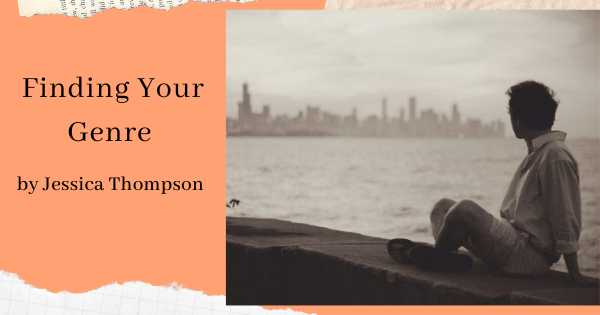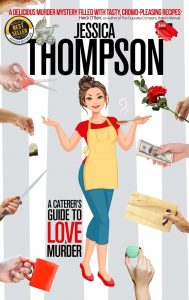by Jessica Thompson, @jessicathauthor
As an author in a very specific subgenre – culinary cozy mysteries – people always ask me how I got into this genre. How did I get started in this? How did I find this niche? Is this even a thing? Yes, I’ve gotten a lot of puzzled eyebrows when I mention my genre.
As for me, picking the subgenre was the easy part. You could even say that it chose me. I like to think that it was my inspiration to start writing seriously. When I discovered mysteries with recipes, the heavens parted, rays showered my face, and a choir of angels sang. Maybe not exactly, but it was clear and automatic. I love mysteries and I love cooking. It was natural and fitting.
So, what if you don’t have a heavenly genre-bestowing experience? What if you like to write several genres? What if you don’t know what genre your story is? What if you are blending genres?
Is it even important? Short answer, yes. Whether you have already written a story or if you are just starting out and looking for a place in this big ol’ crazy writing world, I say find a subgenre.
You don’t have to commit to one genre forever, but I would say that you should for each story. Each genre has an underlying set of rules that you will need to follow (or maybe play with) if you want to meet expectations and have satisfied readers.
Every story has elements of more that one genre, but start by deciding what the point of your story is. Assuming you agree that your main character needs to experience some sort of growth, what kind of growth does your character experience? What is the main conflict in your story? What are the main plot points?
As an example, we can look at my story, “A Caterer’s Guide to Love and Murder.” Obviously from the title, there’s food, there’s mystery, and there’s love. I touch on many versions of love, like friendship, newlywed love, motherly love, and versions of romantic love, but that’s not the point because that is not the main conflict. Love is the lesson my character learns, and the love and the mystery are woven together, but the main storyline is the murder. The whodunnit. The mystery.
In terms of “Save the Cat Writes a Novel” by Jessica Brody, the mystery is my ‘A’ story and the love is my ‘B’ story. The mystery is the inciting incident, the conflict, and the midpoint. The mystery is not the ‘theme,’ but it is just about everything else. The mystery is the t-shirt and the love is the graphic on the shirt. And the food is probably what color the shirt is.
So, having trouble picking which is the main genre for your story? Ask yourself these questions.
What is the catalyst, or event that gets the story rolling?
What question is the reader left asking after the catalyst?
Describe your plot in one sentence. Which parts of the story made the cut?
What is the main conflict in your story?
What are the main plot points of your story?
If your story is part of a series (or will be), what do all the stories have in common?
If your character growth is the main plot, what do they learn? If your character growth is NOT the main point of the story (the way mine is not,) then just ignore this question.
If you have not started writing, you have a different struggle. How to pick a genre to dive into?
What do you like?
What do you know about?
What do you have to offer that few others in the writing community can?
I hesitated to take myself seriously as a writer before I found my genre because I thought the huge pool of writers was too competitive and intimidating.
Shrink that pool! Find the sub-sub-sub-genre that fits your interest. Or create one! I heard that chick-lit didn’t really exist before “Bridget Jones’s Diary”, and everyday there are new bridges and combinations of genres. Just be smart and do a lot of research before creating a new genre, because that’s risky!
Still having trouble finding your niche? Here are some questions to consider.
What are one or two hobbies you are good at (or just enjoy?)
What are some occupations you have had in past lives?
Do you enjoy plot-driven or character-driven stories?
How does your brain work? Do you need the prescribed borders of an established genre or would you thrive in the open landscape of uncharted genre territory?
What type of reader are you planning to appeal to? (You can pick this either before or after genre. I picked after as determined by my genre, but you could do it in reverse.)
How much research are you willing and ready to do?
What type of research would interest you? History, science, occupational, setting, etc.
After asking yourself these questions, hopefully you are hearing some angels singing. If not, write down your answers (as short as possible) and ask someone else to look at your answers. You can schedule an appointment with someone in your local writers organization, run those answers by your critique group, or use this chance to reach out personally to that online acquaintance.
If you truly straddle two genres or subgenres, I think you can use both. I would say two should be your max, especially if you’re a beginner, because you will now have to follow the rules of both genres! Yikes!
Intimidating as your chosen task may be, don’t fret! Your task will now be less intimidating if you have chosen a genre. You’ve found a groove. You’ve picked a lane to help you reach your destination. It doesn’t mean that your tires will be trapped in a rut, it just means that there are now some lovely dashed lines on the road.
Good luck!
Have a burning question? Contact Jessica on Instagram, Facebook and Twitter as @jessicathauthor
Find her cozy mystery with recipes, “A Caterer’s Guide to Love and Murder” on Amazon now.
When Jessica discovered mystery novels with recipes, she knew she had found her niche. Jessica is an avid home chef and is active in her local writing community, including being a member of the Writers’ League of Texas. She received a bachelor’s degree in Horticulture from Brigham Young University but has always enjoyed writing and reading mysteries. Jessica is originally from California, but now has adopted the Austin, Texas lifestyle with her husband and two children.
Tips for Helping Writers Find Their Genre by @jessicathauthor : Share on X
Photo on VisualHunt



Thanks, Jessica, for this very helpful checklist for writers trying to figure out their main genre!
Great tips, Jessica. As a reader, I sometimes look for a book in a certain genre but like that a story can cover several genres at the same time like romance and mystery. Wishing you continued success.
I always knew what genre I wanted to write, but it wasn’t until I finished my first book that I knew the subgenre.
These are such good ideas! I think it’s very important to really reflect on what sort of novels we want to write – what our genre will be, and focus that way. Doesn’t mean we can’t write something else, but it makes sense to hone one’s skills in one area before ‘branching out.’ I know it’s helped me.
I love mysteries with recipes. I write such a series myself, my Chantelle McBride series. I just ordered The Caterer’s Guide… om Kindle Unlimited and can hardly wait to get started. I hope it has lots of recipes. That’s one of the fun things I like abut my series. I get to make up lots of fun recipes and try them out on my friends.
Sorry for the typos in my last post. If the text was in black instead of gray, it would be easier to find my typos and correct them. Why do so many websites use gray??? I hate it. I have macular degeneration and if it’s not black on white, I have a hard time reading it.
Typos happen to all of us! I’ll try to figure out how to change the font color in comments or have my designer to take a look…thanks for letting me know!
Thanks everyone! This was fun to write! Sorry the page isn’t letting me respond to you all individually, but it’s been lovely to read your comments!
To me writing what you like to read is a great start. I love mysteries but mostly mysteries with thriller aspects. I like to read cozies, but not sure if I could write one. Great article!
Teresa
Great tips and questions to ask! This one is my favourite: Describe your plot in one sentence. Which parts of the story made the cut?
Asking myself something similar at the beginning of my Bloo Moose books helped my get focused and realize small-town romantic suspense is a thing!
I love this! I write mystery, too, but with a love story. And in some, also a paranormal element. It’s so much fun blending everything together and seeing how it comes out. I like your analogy with a t-shirt. I’m going to steal it while planning my next book. Thanks. Hi, Elizabeth :)